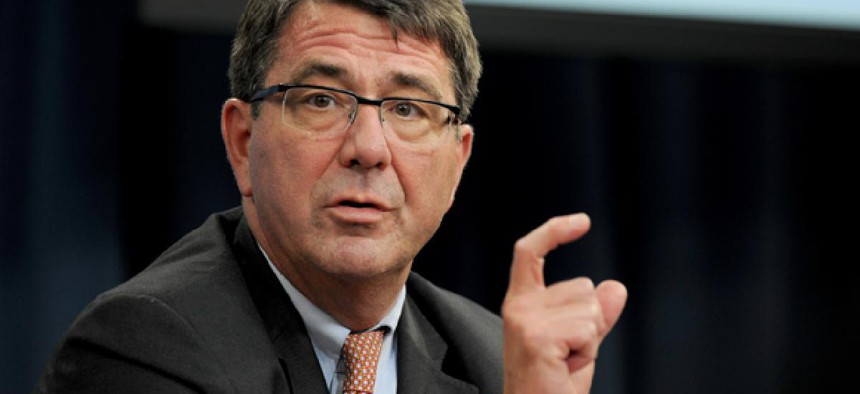
Deputy Defense Secretary Ashton B. Carter Defense Department
Pentagon’s No. 2 leader criticizes lawmakers’ add-backs to Defense bill
Ashton Carter says cuts to TRICARE and force size are needed.
Stressing the need for a strategy-driven approach to trim Defense Department spending, Deputy Defense Secretary Ashton B. Carter on Wednesday cautioned Congress that “every dollar spent on bold, unnecessary programs is a dollar we lose for necessary programs.”
Recent steps by the armed services committees to restore certain cuts the Pentagon proposed in the fiscal 2013 budget risk “hollowing out” the readiness of the all-volunteer force and upsetting the balance of the department’s long-term strategic portfolio, Carter said. “Others can pick one program they favor, but we have to balance them all,” he added.
In a speech at the American Enterprise Institute, Carter, the former Pentagon acquisition chief who was introduced as “the epitome of the defense intellectual,” said Congress is unwisely resisting the proposed new requirements that retired TRICARE beneficiaries pay higher premiums. “Health care is 10 percent of our budget, so we have to control spiraling costs, and we need these savings to back investments,” he said.
The same need also applies to planners’ proposals to defund some of the Air Force’s older single-purpose aircraft and some of its intertheater and intratheater “lift” capability such as use of C-130 transport planes, he said. In the new era of tight budgets and the winding down of protracted wars in Iraq and Afghanistan, “the Army and the Marines face the most titanic transitions, from a focus on counterintelligence and counterterrorism to the wider spectrum of the capabilities we need,” Carter said. “If they’re prohibited from reducing, it frustrates the ability of the Army and Marines to make those transitions for the future.”
Carter also took pains to assure contractors that “a vibrant and substantial defense industry is in our national interest.” As contractors adjust to changes in market forces, Defense Department managers “do keep an eye out for any changes that might be deleterious in the long run,” he said, counseling against a focus on short-run incentives such as those used in the financial and housing industries during the run-up to the 2008 financial crisis. The Pentagon should preserve key “skill sets from industry that if allowed to go away, will be expensive to re-create,” he said. Industry has been invited to identify those skill sets for the fiscal 2014 budget.
Beginning with the transition from the Pentagon’s leadership under Defense Secretary Robert Gates to that of Leon Panetta’s, Carter reviewed the molding of the long-term defense strategy released in January after months of consultation among the Joint Chiefs of Staff, the secretary and President Obama. The plan makes history-making cuts and focuses on Asia and the Pacific as opposed to Europe and the Middle East.
He said Obama provided good insight in advising against last in-first out priorities such as initially cutting those programs with the shallowest roots, because they could be the most important in the future. Examples include cyberwarfare and certain science and technology research, counterterrorism, space warfare, and remotely piloted aircraft for all the services.
But some older legacy programs are simply no longer affordable, Carter stressed. The Pentagon’s commitment to its strategy “remains steadfast,” despite the confluence of historic changes in postwar strategic needs and last year’s Budget Control Act.
That law’s threat of sequestration, or mandatory cuts of nearly $500 billion over 10 years for defense, “is designed to be irrational” to force tough choices, he said. “Planning has a rational tone to it. But sequestration would have devastating effects on flexibility in deciding, and in size and nature would nullify our postwar strategy,” he said. Managers throughout government, at NASA, and at the Health and Human Services and Homeland Security departments, “would find it impossible to cope with the irrationality,” he added.
Because “we’re at a time of great consequence for the American defense,” planners need to pivot to what’s needed for the future, or what Joint Chiefs Chairman Gen. Martin Dempsey calls “the Joint force of 2020,” Carter said. “We would have to make this transition even if we had all the money in the world.”
He suggested those who are upset by defense cuts view the strategic plan not “as subtraction alone, but as an ice sculpture. You can watch the chips fly away, or you can watch the new shape emerge.”
Carter defended the new strategy’s components of “better buying power,” to keep the confidence of the taxpayer, and he reinforced the Pentagon’s proposal for a new round of base closures under the Base Closure and Realignment Commission. “It’s not exactly a crowd-pleaser, but how can you not do it?” he asked. Congress has largely turned thumbs-down on a BRAC revival.
Carter said the Pentagon has told managers it also will favor programs that are best managed in terms of cost savings. “The poor performers are presumed to be on the chopping block,” he said.
In answer to a question from a visiting student from the University of Southern California, Carter said, “I hope you will consider a public policy career. It’s nice to get up in the morning and do things that are bigger than yourself.”
NEXT STORY: A 'military vote' that doesn't really exist







